The Responsibility of Alumni Relations
CASE District I wishes to thank PeopleGrove for their generous commitment as our 2020 gold sponsor of the CASE District I Conference Mentoring Program. PeopleGrove has been a CASE DI sponsor for four years.
Is the Transaction Really Over?
In his 2018 Netflix special Kid Gorgeous at Radio City, comedian John Mulaney described receiving a letter from his college. After the usual formalities—“Hi John, it’s college. You remember?”—the letter proceeds to ask for a gift. Or as Mulaney phrased it, “Give us some money! As a gift! We want a gift...but only if it’s money!”
Mulaney goes on to explain his bewilderment. You see, he gave his college a tuition payment every semester and his college gave him “a weird cinder block room with a Reservoir Dogs poster on it, the first real heartbreak of his life, and a degree in a language I already spoke.” He sums up his thoughts with “I thought our transaction was over.”
Two side notes: first, the bit is crass and expletive laden, so fair warning. And second, the following year Mulaney participated in a show that raised $1 million dollars for first-gen students at his alma mater...which also happens to be mine. So he gets it!
Of course, one can’t help but laugh as he describes the usual university advancement communications. The letter he received said “it’s been a while since we’ve heard from you.” How many of our institutions have sent that same letter? Can you say that you yourself haven’t received such a letter from your own alma mater? Did you have the reaction that Mulaney did? “Well it’s been a while since you’ve housed and taught me.”
If the audience’s thunderous applause is any indication, his perception is not unique. Many alumni still look back on their college experience as a “transaction.” As the price of college increased at a rate 8 times that of wages since the 1980s and student debt totals increased 107% in the past decade, the value of this transaction has been called into question more and more. These are just some of the factors that have led to a decline in the public perception of higher education.
We in higher education know that the value we provide is “greater than the sum of its parts.” However, like it or not, colleges and universities must fight this perception and prove that the value of a degree extends far beyond graduation. It’s time to call in the cavalry to ensure that alumni know the “transaction” is not over.
Change Accelerated
In early May, we hosted a virtual conference. Innovators presented by PeopleGrove gathered some incredible thought leaders to discuss how institutions are preparing for the new normal and the new student journey. In our keynote, Farouk Dey and Susan deMuth of Johns Hopkins reflected on how COVID-19 has affected trends already in progress in higher education. Aspects of the student experience and elements of the alumni journey that had already been in the works were now too critical to be left to chance.
For alumni relations, the importance of providing continued career support to graduates is the change that has accelerated. As more than 40 million people join the unemployment line, your graduates will turn towards their alma maters for help. Particularly, those who expect a high return for a high investment. This is a trend that was already in motion pre-COVID, but is now firmly in the spotlight in the new normal.
Survey after survey has shown that graduates rank career support as the biggest gap between the expectations and the performance of alumni relations. “I think a lot of what we're seeing is people doubling down on the career development and professional development support that has already been building in our industry at varying speeds and in varying shapes and forms,” Lisa Vaccarelli, Senior Consultant and Plus Delta Partners shared during our conference. The difficult economic times wrought by COVID-19 has made this support the primary means of alumni relations—particularly with young alumni who are facing the second economic downturn and slow recovery of their short careers.

Of course, students themselves are also feeling the pressure. Luckily, alumni volunteerism is the second trend accelerated during this crisis. The same surveys that tell us alumni are asking for additional career support, also tell us that alumni are willing to pay it forward and mentor students. Many leaders in the space have already put the call out to their alumni asking them to support this year’s graduates so that the institution avoids these graduates becoming the Lost Class of 2020. “We have a graduating class of almost 9,000, so that's a big piece of pie,” said Jeff Minhas, Executive Director of Alumni Relations at the University of California, Irvine. “We are making sure that our students feel supported by the university as a whole, and the alumni are one of the most powerful resources that we can bring to the forefront.” It’s this opportunity to pay it forward that alumni are asking for—above the opportunity for socially distanced happy hours or Netflix watch parties.
Three Strategies
Understandably, this seems challenging. To extend career support to tens of thousands of alumni when the national average is 2900+ students to every 1 career center staff member is an impossible lift. Thankfully, the playbook to bring these opportunities to alumni is being implemented as a part of a new student journey. Institutions are creating vibrant networks that replicate the knowledge exchange that happens organically on campuses. Here are some elements of that strategy that can inform efforts to bring this to your community:
- Identify Support Systems
Schools are beginning to see that models of student support need to revolve around community and connections. Innovators like Farouk Dey have begun to work through institutional change to create webs of support for students throughout their journey. Consider where you have knowledge-sharers within your alumni community and offer them the ability to share their expertise. These can be in the form of formal mentor programs or even through informal networking chats. Using models like those presented by Julia Freeland Fisher in an Innovators Talk recently can leverage the strong and weak ties that exist in your community.
2. Communicate Continued Value
There is no reason to be shy. Alumni need to know about the existence of these communities, and their value has to be strongly communicated. Thankfully, this work has already been in the works in many alumni departments (change accelerated!). Many have even been thoughtfully and intentionally building communities brick-by-brick to facilitate engagement. However, without the need to advertise homecomings and reunions, there is nothing stopping your institution from putting this value front and center while expanding the approach. Perhaps John Mulaney would be happy to see his alma mater put Career Resources and their networking community at the top of their virtual resources for alumni.
3. Outputs over inputs—on and offline
In this new normal, relationships will start online. There is no going back in that regard, even when we return to a semblance of pre-COVID normal. However, those communities who will be positioned for success will be those who can facilitate relationships that blur the line between virtual and in-person. In a recent Chronicle of Higher Education article, Northeastern President Joseph Aoun said, “The institutions that thrive post pandemic will be those that understand how humans cross the boundaries between the physical and digital—and back again.” The digital boundary has to be blurred for relationships to thrive in both settings

By facilitating these digital networks, you also have the ability to begin to understand outcomes rather than inputs. What are these relationships driving? How are people being supported through these connections? These are critical questions that technology can help answer. As Farouk Dey shared during his keynote, "Now more than ever in education, value must be measured by looking at the outcomes rather than simply the inputs. We can't just look at how many people showed up or engaged with us. We need to understand what that engagement has done for that person." Understanding the outcomes your stakeholders get from your work rather than just counting the those who engage is critical to the future of alumni relations.
The Value is in the Relationship
As a part of the new student journey, alumni relations will experience a shift in focus over the coming years. The social gatherings that had made up the bulk of how relationships are maintained and enhanced with graduates no longer serve the needs of the audience. Career support and volunteer opportunities are what stakeholders are asking for. By providing these opportunities, alumni relations and advancement can build the relationships needed to be successful and continue to raise money for the worthwhile needs of their institutions. Though it may certainly be the long game, institutions who focus on the short term and do not meet these needs run the risk of failing to build important foundations with tens of thousands of alumni.
At PeopleGrove, we have designed and built networks with our partners to support the varied needs of alumni. From networking communities, mentorship programs, affinity groups/clubs, and even membership tools, we’re proud to be supporting hundreds of universities as they create spaces to provide continued value to their graduates.
About the author(s)
Matt Kelly is the Strategic Marketing Manager at PeopleGrove. In this role, he leads the efforts to research and address issues in higher education including equitable access, career services, and alumni relations with PeopleGrove's over 300 partners. Matt joined PeopleGrove from his alma mater of Georgetown University where he worked in the Office of Advancement and Alumni Career Services. He led the efforts there to grow alumni programs designed to support the career aspirations of students and his fellow alumni.